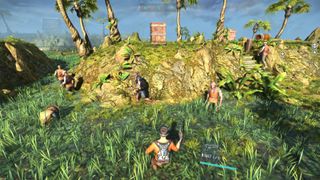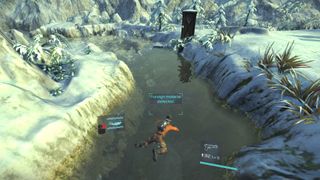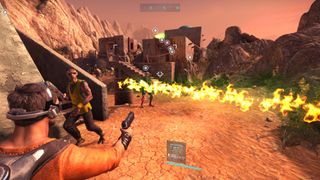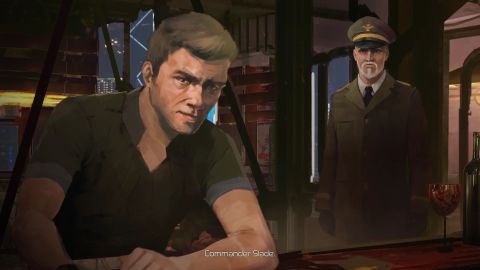Our Verdict
A fine remake of a game that deserves to be played as much as it gets fondly remembered.
PC Gamer's got your back
What is it? A remake of the beloved '90s action RPG, with its old voxels now replaced with polygons—and a good chance of actually running on your PC! Not to be confused with Outcast 1.1, a straight update/re-release of the original.
Expect to pay: $35/£30
Developer: Appeal
Publisher: Bigben Interactive
Reviewed on: i7-6700K 4Ghz, 16GB RAM, GeForce 980Ti
Release date: Out now
Link: Official site
Back in 1999, Outcast was arguably as close to the PC's answer to Legend of Zelda as we've ever seen. Effortlessly charismatic. A huge open world that invited free exploration. The absolute latest in graphics technology, at a time when something as simple as ripples in water was a sight to behold and huge sprawling worlds weren't simply majestic, but outright magic. For the five people who could run it, it was an unforgettable, glorious adventure.
Seventeen years later, it's a little clunkier than remembered. The good news is that the magic still lingers. Our dimension-jumping hero still has the laughably '90s name 'Cutter Slade', but the world of Adelpha in which he finds himself remains a gorgeous land full of life and varied biomes to explore, with a surprisingly deep culture to befriend in his quest to save their world and our own from a science experiment gone wrong. Think Stargate, only without every new adventure conveniently taking place in a woody part of Vancouver.
It's a testament to the original game that, seventeen years later, its aesthetic still feels so fresh. Indeed, it's no slouch if you play that version, now available as Outcast 1.1, rather than this full remake. The sense of exploring an alien world is just as captivating whether rendered in modern polygons or classic voxels—3D pixels—even if graphics have advanced to the point where ripples in water are no longer something to stare at like a cat encountering its first laser pointer.

Shifting to polygons does of course detract from Outcast's unique look, but it was the right decision. They were useful before 3D accelerator cards because the CPU could handle them far better than polygons. Flight sims would use them for organic terrain, for instance. Even though the trade-off was pixels the size of Shreddies, and for Outcast, tiny resolutions and framerates best described as 'torture'. As interesting as it would have been to see what modern CPUs could do with them, going with polygons for this remake makes more real-world sense. Either way, this is easily the prettiest Outcast.
More importantly, under the skin it's still the same game, with a few quality of life improvements. Alien language translations are now included in the subtitles, so that you aren't left scratching your head when someone mentions something like a 'Daoka' or the 'Yods', and characters now have both their names and a quick description floating over their heads to spare you running between largely identical looking NPCs. There's also autosaving, and the option—off by default—to have modern health recharging rather than medikits.

That's about all it gives you though. There are still no handy map markers and the like, with Outcast expecting you to learn by exploring and asking the natives for directions, as well as simulation elements like having to wait for crafters to make new ammo instead of it just appearing when you hand them the resources. For veterans, the compromises feel fair and well considered.
Coming to Outcast as a brand new experience, expect a very solid adventure but probably not a second chance to party like it's 1999. The first hour in particular isn't thrilling, and the first real zone—the temples and rice-paddies of Shamazaar—arguably the hardest to navigate and figure out how to win. Much of the blame for this has to go to the outdated controls, which are clumsy in exploration, floaty in combat, and don't allow much climbing around the levels. Far too many light inclines may as well be mountains or guarded by force fields.
The good news is that after that first hour, Outcast really opens up—literally, in that you can go wherever you want, and in terms of atmosphere. The initially awkward people of Adelpha, the Talan, quickly reveal themselves to be a fun lot, with Cutter bringing a very Bruce Willis style sarcasm to their more pious speeches and his own role as their prophecied hero, the Ulukai. Particularly fun are their workarounds for being a pacifist species in the middle of a religious war—that while they are entirely peaceful, they would never tell you how to behave. With your advanced guns. And that big pile of ammo. Cough.

They're also a fair bit more complex than your average NPCs, being able to find each other, and offering ways to sabotage the enemies through quests. Stop the farmers of Shamazaar supplying them, for instance, and enemies in the area drop to half-toughness. Admittedly, by modern standards it's not super convincing and you can definitely see the strings, but it's still more than most games bother with—along with some surprisingly advanced friendly AI.
For new and returning players though, Outcast still has its most important quality—that deep charm. It covers up the often awkward combat and movement, and adds immeasurably to just running around and exploring and learning Talan culture in a way James Cameron can only wish folks wanted for the Na'vi. Adelpha remains a wonderful world to spend time in, and its story knows exactly how long you'll want to do so. It remains a shame we never got the planned sequel, but at least its legend and legacy now live on in style.
A fine remake of a game that deserves to be played as much as it gets fondly remembered.

